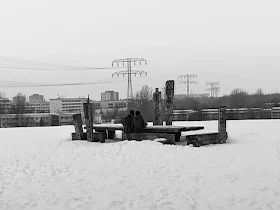A film which does not really turn into
a narration. I remember during one of these great lectures on
“Dramaturgy of films" by Ernst Schreckenberg from “Komunales
Kino”, Dortmund once said that our memory works selective. What
remains of a film in the memory are often moments. Truffaut once
wrote that he had difficulties to reconstruct the story of a film he
just saw. His enthusiasm as a young cinephile also was often caused
by single moments.
The Days Run Away Like Horses Over The Hills presents every day fragments
of women, from a very cute toddler called Elise to old women.
Only at the first sight we have the
illusion that the film just films how life is without “ups and
downs” like Ozu once defined his ideal of a Cinema on every day
life. More or less the fragments we see in this film and which finally will be part
of our memory, are exactly the pendant to parts of our
life we probably forget very soon. That makes each moment very
fleeting and we forget for a moment that this film can be
watched again if on the screen or on DVD.
There is for example a young woman
taking care of our Elise as a day nanny. While Elise is walking
around opening cup boards, the young woman is resting on the floor.
This scene is filmed in a very Ozu-like Low position and as this film
is made in the classic Academy format, it accentuates more the
verticals in this frame. Through this low position, a toddler which
we usually see from above we now look up to the child. One can enjoy
this moment not only because of this cute toddler Elise but Elise is
also a very good introduction to this film, her curiosity inspirers
our own.
Three young women having a party in an
almost empty apartment, talking and dancing. Nothing important seems
to happen - we think for now. The idea filming every day moments which
seem banal and which we realize later as condensed like a Haiku is
very familiar to me because of Ozu and his incredible masterpiece Bakushu.
We see a young woman taking a shower
hidden by a shower curtain, protected against any voyeurism. Later she
puts her face on which is shown in close up. We see an image of her
and at the same moment she established an own image of herself. The
Black and White image turns colored.
The film moves to old women in
Poland. Even though the film remains recording every day moments, we
see the difference. These old women are in the middle or near the end
of their life. There is a long dialogue during an afternoon coffee
where an old women tells about a beloved person she has lost.
What I did n´t know during seeing this
film and what I read some days later in the press text in the
director´s statement that all persons who appeared were the
director´s former girlfriend, other friends, hist mother,
grandmother and their friends. Like in an Ozu-film these different
generations of women and this different living environments are
different approaches to find a place in life. The Days Run Away Like
Horse Over The Hills by Marcin Malaszcak is not a film you just watch,
it is a film which work in the memory days after you have seen it.
Watching is here to acquire what you have seen and finally edit in
your memory. And like in this film it happens often in cinema that
through fragmentation of the things revealed in the film the scope of the world is the more imaginable
Rüdiger Tomczak
Screenings:
Feb 7, Sat Kino Arsenal 22.45
Feb, 13, Fri, Delphi 22.30
Feb, 14, Sat Zoo-Palast 2, 14.30

No comments:
Post a Comment